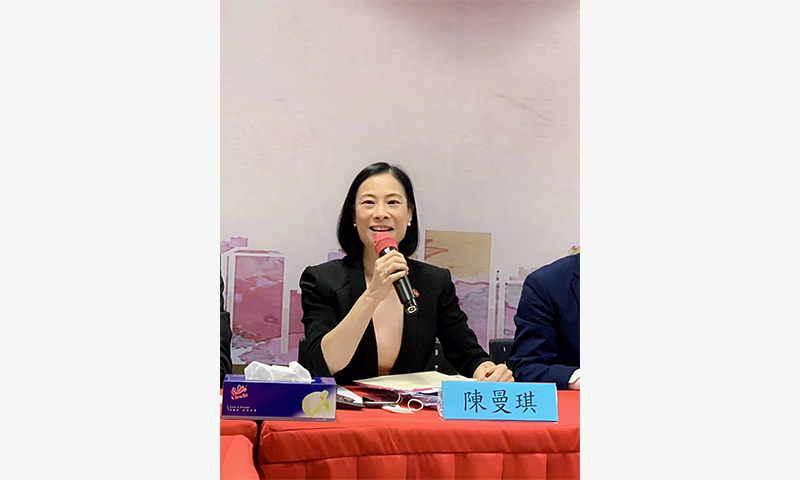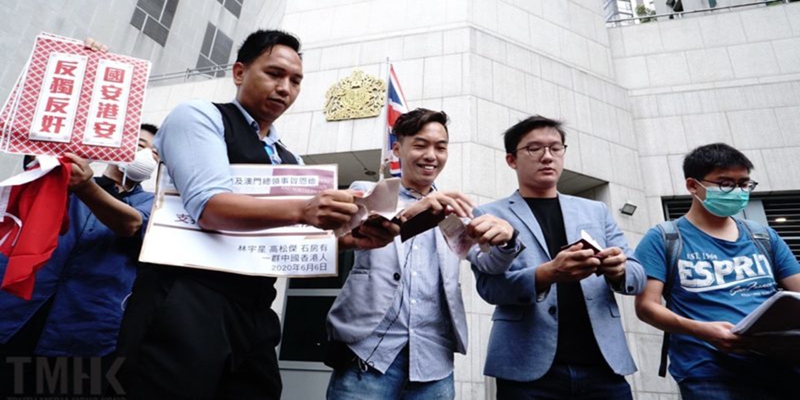Mastery of Constitution and Chinese proficiency should be prerequisites for national security judges: Hong Kong lawyer
By Wang Wenwen and Zhao Juecheng Source: Global Times Published: 2020/7/18 20:53:35

Photo:VCG
A Hong Kong lawyer has refuted the UK Supreme Court's decision, which, according to a Reuters report on Friday, would continue to assess UK judges' positions in the Hong Kong Court of Final Appeal, the city's top court, amid the recent enactment of the national security law for Hong Kong.
"It shows the stark-naked truth that UK judges are subordinate to the UK government, and foreign governments are using their judges to interfere in Hong Kong's judicial independence and the enactment of the national security law, which will pose a threat to China's national security," said Maggie Chan Man-ki in an exclusive interview with the Global Times.
"The UK's Supreme Court still views Hong Kong as the country's former colony and the UK courts as superior to Hong Kong's judicial institutes," noted Chan.
Chan, who is also Hong Kong's deputy to the National People's Congress (NPC), attended the 20th session of the 13th NPC Standing Committee in late June when the national security law for Hong Kong was reviewed and passed. She has proposed that foreign judges be barred from national security trials.
She also contends that judges who hear national security cases in Hong Kong should comprehensively understand and master the Chinese Constitution and the Chinese language.

Maggie Chan Photo: Courtesy of Chan
Chan told the Global Times that Hong Kong's legal system and judiciary always adhere to the principle that conflict of interests should be avoided. Judges who have dual nationality or have made a pledge to another country aren't fit to hear national security cases, she added.
The passed law, however, does not specify the nationalities of judges. Article 44 of the law empowers the chief executive to designate a panel of judges to handle cases concerning offenses endangering national security. The chief executive may consult the Committee for Safeguarding National Security of the Hong Kong Special Administrative Region and the Chief Justice of the Court of Final Appeal.
Chan believes this article is a combination of merits of the two laws - the national security law and the Basic Law, and does not conflict with article 92 of the Basic Law. Article 92 stipulates, "Judges and other members of the judiciary of the Hong Kong Special Administrative Region shall be chosen on the basis of their judicial and professional qualities and may be recruited from other common law jurisdictions."

Hong Kong residents tear up BNO passports in front of the consulate to protest against UK interference over the national security law. Photo: Courtesy of Ko Chung Kit Jacky
Chan told the Global Times that while the chief executive's selection of judges on hearing national security cases will adhere to the "judicial and professional" requirements stipulated in article 92 of the Basic Law, not all Hong Kong judges of the common law system have "professional qualities" to hear national security cases.
"As the national security law for Hong Kong is a national law that touches upon issues of the Constitution and the background and systems [both socialist and capitalist] of the country, if a judge cannot comprehensively understand and master the Constitution, he does not have the 'professional qualities' required to hear national security trials," Chan explained.
She also noted that as the language of China's legal system and national laws is Chinese, a mastery of the Chinese language should also be interpreted as a "professional quality" for judges concerning the national security law, and these two points are the main reasons that she proposes barring foreign judges from hearing national security trials.
Chan said the enactment of the national security law for Hong Kong shows the central government's fundamental authority and responsibility in looking after national security affairs in Hong Kong when the local legislation of article 23 of the Basic Law is absent. As for the circumstances when "a major and real threat to national security has occurred" that would lead to the Office for Safeguarding National Security of the Central People's Government in Hong Kong to exercise jurisdiction over a case, as stipulated in article 55 of the national security law, the power of interpretation shall be rested in the NPC Standing Committee to define the threat.
"There should not be too many restrictions on defining such a threat, as the aim of the national security law for Hong Kong is to solve problems that Hong Kong itself cannot solve," said Chan.
Posted in: HK/MACAO/TAIWAN